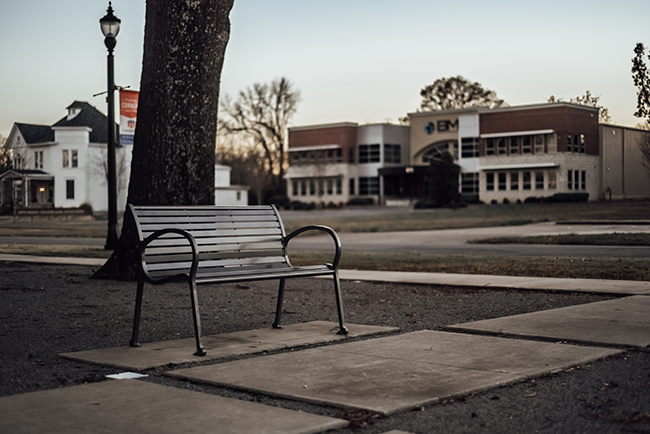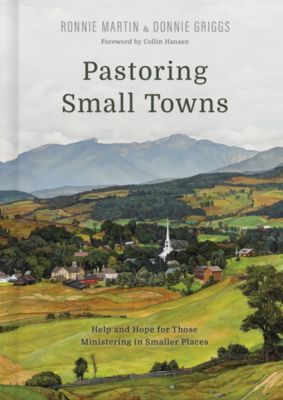
How does the fruit of patience help us cultivate a sanctifying slowness? How can those pastoring small towns use slowness to their advantage?
By Ronnie Martin
When we wrestle with slowness, we begin to see patience as a virtue that God shapes our hearts to reflect. Mary was being patient when she sat at the feet of Jesus.
I’m sure she didn’t deny that tasks needed to be accomplished so that she and Martha would be appropriately hospitable to Jesus. But she was patient about getting there. And Jesus was using her “nonproductive” patience to produce something beautiful and Christlike in her character. Mary was living out what she valued. But it would be hard to be measured if you compared it to the buffet table Martha was frantically preparing.
So how does the fruit of patience help us cultivate a slowness that does serious, sanctified work on our hearts? In other words, how do we use slowness to our advantage when pastoring in our small towns?
People not projects
The slowness of patience leads us toward treating our people less like projects that need to be completed and more like people who need the completeness of Jesus to provide them with wholeness. In the Gospel accounts we get no impatience from Jesus. Well, of course, you might say, because He was perfect. But even in His perfection, Jesus could have viewed His work with the disciples with a bit more urgency than we see.
“The slowness of patience leads us toward treating our people less like projects that need to be completed and more like people who need the completeness of Jesus to provide them with wholeness.” — @ronniejmartin Click To TweetRemember, He only had three years with these brothers. And even a week before His death, they still didn’t know He was going to the cross. Imagine how frustrating this would have been for us. Imagine how frustrated you become with some of your leaders and parishioners because it seems like all you do is have the same conversation repeatedly with them.
In his epistle, James has the wisdom of farmers for us because they didn’t treat their crops like something that was meant to be instant. The fruit they wait for is precious to them, just like the precious people you wait for and wait with.
God didn’t design His people to grow fast and become potentially disposable as a result. In God’s design, people were never meant to be like fast-food wrappers that get discarded as soon as everything is gobbled up and consumed.
God sets a different table with His people, something slow-cooked and finely seasoned and meant to be enjoyed over slow, leisurely, unhurried time. Are you comparing God’s people with a good meal, Ronnie? I mean, kind of. But I think you get my point.
Slowness treats people like God’s image bearers who are being beautifully sanctified with the patience of God’s slowness. They’re not projects for pastors to complete so that boxes can be checked and congregations can see the productivity of their hands. This should change how we view discipleship, shouldn’t it?
Non-damaging discipleship
Instead of seeing discipleship as a frantic push toward creating people in our own image, the sanctified slowness of patience helps us re-engineer this damaging directive. The emphasis becomes more about becoming than about doing.
When I look at my current elder team, it’s hard to remember who these men were when they started. But it only benefits me to remember their growth and for them to remember how I’ve grown as well. Only through hindsight do I get to look back and measure the slow ways they have grown in godliness. This kind of hindsight is a happy thing. If I had expected years ago what I’m enjoying today, I wouldn’t be enjoying anything today at all.
“Non-damaging discipleship is looking at our people with the patient eyes of Jesus, while simultaneously keeping our eyes in the mirror so we don’t forget the slowness of our own sanctification.” — @ronniejmartin Click To TweetMy discipleship of these men would have been fast, jerky, and demanding. It would have been like everything we attempt to do fast, which produces a kind of franticness that remains at odds with faithfulness. These men wouldn’t have had the opportunity to receive “the early and late rains” of their lives with a pastor who saw their growth as something to be enjoyed rather than despised because of the slowness of it.
Non-damaging discipleship is looking at our people with the slow, patient, and compassionate eyes of Jesus, while simultaneously keeping our eyes in the mirror so we don’t forget the slowness of our own sanctification. This helps us in those seasons of both slow change and no change. We become more like farmers, who are more like Jesus. We wait for the early and late rains, and the waiting fills us with hope.
Waiting as the means for hope
Even as you are reading these words, whether it’s with the internal pacing of a Mary or a Martha, I want you to pause and wait a second before continuing. Close your eyes. Take a deep breath. Exhale slowly. What might the Lord be surfacing in your heart as you reflect on the deep truths communicated to us in James and Luke? What are you reminded of as you consider the face of Jesus, smiling at you with love in His eyes like He did for Martha in all her hurriedness?
The words of James become like a balm to our hurried hearts because His word to us is to strengthen our hearts. To set our hearts on the coming of the Lord. To keep our hearts firmly embedded in the knowledge that Jesus is here with us now (Spirit) and will be coming soon (bodily). We can wait with the patience of slowness because God is going before us in all things. And all things find their culmination in Him.
“Hurriedness is not hopefulness.” — @ronniejmartin Click To TweetHurriedness is not hopefulness. Hurriedness comes from the heart of someone who only wants to measure progress through the productivity of the head and the hands. But hopefulness works in the waiting. And waiting is the work of God’s heart to create hearts in us that are reflected through our heads and hands.
For the grace of God has appeared, bringing salvation for all people, instructing us to deny godlessness and worldly lusts and to live in a sensible, righteous, and godly way in the present age, while we wait for the blessed hope, the appearing of the glory of our great God and Savior, Jesus Christ. He gave himself for us to redeem us from all lawlessness and to cleanse for himself a people for his own possession, eager to do good works.
Titus 2:11–14, CSB
Waiting for our blessed hope becomes the daily pattern and lifestyle of the slow, patient pastor, who gets to enjoy the happiness that comes from unhurried hindsight, rejoicing in all the Lord is doing and has done.
For permission to republish this article, contact Marissa Postell Sullivan.

Ronnie Martin
Ronnie is the planter and founding pastor of Substance Church in Ashland, Ohio.
Excerpted with permission from “Pastoring Small Towns” by Ronnie Martin and Donnie Griggs. Copyright 2023, B&H Publishing.








